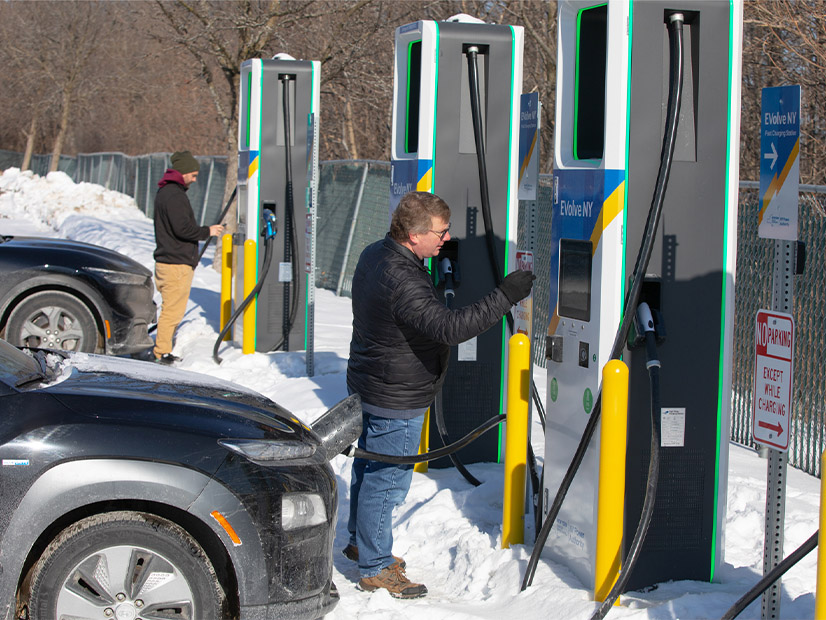
A group of New York legislative committees are working together to establish whether the state has a clear electric vehicle charging deployment plan so residents will be comfortable buying clean cars.
To meet state climate goals, New York needs to incentivize EV adoption, but the lack of consumer confidence in being able to charge EVs “is still very problematic,” Rep. William Magnarelli, chair of the House Transportation Committee, said during a hearing on Thursday.
Four House committees convened the hearing to identify existing plans and programs for building EV charging facilities and what the state can do to expedite infrastructure development.
Currently, New York has 90,000 registered EVs and 9,000 charging stations to support them, said Adam Ruder, assistant director of clean transportation at the New York State Energy Research and Development Authority (NYSERDA).
“New York needs tens of thousands more charging stations in the coming years and hundreds of thousands more in the coming decades to serve the number of EVs that will be on our roads,” he said.
Gov. Kathy Hochul signed a clean cars law in September that sets a goal for all new passenger car and truck sales in the state to be zero-emission by 2035. The bill directs the Department of Environmental Conservation (DEC) to prepare an EV market development strategy this year.
“This effort will include a thorough evaluation of EV infrastructure needs and will be grounded in analytical work being done by NYSERDA to build upon the substantial investments and programs already in place,” said Jared Snyder, DEC’s deputy commissioner of air resources, climate change and energy.
Programs and Progress
State supported EV infrastructure development is spread out across different programs and agencies.
At the DEC, for example, the Climate Smart Communities program helps local governments with climate- and energy-related activities with grants and rebates. To date, the program has funded the installation of 650 public charging ports, Snyder said.
“In most cases, these are Level 2 chargers, but a few communities have invested in [fast] charging,” he said.
NYSERDA wrapped up its three-year Charge Ready NY program last year for Level 2 public charging stations, completing 3,000 charger installations and approving another 1,000 that are currently under development. The agency is also funding fast-charging station deployment in Upstate New York with a target of installing 92 stations over the next two years, Ruder said.
In addition, he said, state agencies are reviewing new federal guidance on how they can use an estimated $175 million for EV charging coming from the Infrastructure Investment and Jobs Act over the next five years. (See States to Get $615 Million for EV Charging from IIJA Funds.)
In November, Hochul announced that state utilities would begin implementing an EV charging make-ready program to deploy 50,000 Level 2 chargers and 1,500 fast chargers over the next four years. The utilities are on track to meet those goals, with active applications for more than 800 fast-charging ports and 20,000 Level 2 ports, said Zeryai Hagos, deputy director of the Office of Markets and Innovation at the New York Department of Public Service.
EV charging deployment efforts at the New York Power Authority (NYPA) have underperformed based on stated programmatic goals, a Feb. 4 State Comptroller report said.
“The authority’s very slow startup is of great concern,” Rep. Steve Englebright, chair of the House Environmental Conservation Committee, said during the hearing.
New York officials launched Charge NY in 2013 to be administered by NYPA, NYSERDA and DEC. An initial program goal of deploying 3,000 charging stations increased in 2018 to 10,000 stations by 2025. Under the Charge NY umbrella, NYPA launched a $250 million program in 2018 called EVolve NY to install fast chargers on major highways through 2025.
By the end of 2019, NYPA had not met its goal of installing 200 fast-charger ports, the report said. In total, NYPA had installed 140 charging stations with 499 ports under Charge NY and EVolve as of September 2020. Of those installations, only one was a fast charger for the EVolve program, the report said.
To date, NYPA has 60 fast chargers installed at 16 sites, Sarah Salati, executive vice president and chief commercial officer, said.
“Based on the audit, the numbers are abysmal, and I’m particularly upset about the fact that there’s really missed opportunities,” Rep. Keith Brown said during the hearing.
As part of its original EVolve program goal, NYPA expected to build 100 fast chargers in collaboration with the New York Thruway Authority. That work, however, was delayed by the thruway authority’s plan to update a group of rest areas, and Salati said the chargers project “was undertaken by a private sector entity.”
In addition, Salati said NYPA did not receive regulatory authority to install chargers at non-governmental sites until April 2019, which delayed buildouts at non-public sites. Pandemic supply chain issues have stymied more recent efforts to advance the fast-charging program, she said.


